
Recently on Cyclingnews.com |
An interview with Jan Ullrich, September 13, 2005
Staying motivated
Lance Armstrong has dominated the modern era yet Jan Ullrich very much remains a superstar of modern cycling. Eight years after his first (and last) Tour win, he's still dreaming big, looking for one more yellow jersey victory before calling it a day. Cyclingnews' Shane Stokes was one of several journalists who sat down with Der Jan recently, talking to him about his battles with Armstrong, life after the Texan's (supposed) retirement, morale and motivation plus the new generation of challengers which is coming through.
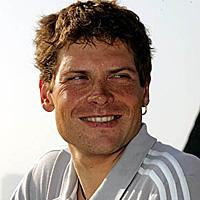
|
On the eve of the final stage of the Tour of Britain, an Eddy Merckx Gala Dinner was held in the heart of London. As the name suggests, Merckx was the guest of honour but an equally warm reception was given to a surprise guest, who received a standing ovation when he arrived halfway through the proceedings.
Jan Ullrich won the Tour de France in 1997 but since then has become the modern-day equivalent of cycling's 'eternal second', Raymond Poulidor. Four decades ago it was all about Poulidor versus Anquetil, the former losing out to the latter time and time again in the Tour but, at the same time, winning the hearts of a public who appreciated his fighting spirit and graciousness in defeat. The modern era has seen a parallel; namely the ferocious yet ultimately one-sided struggles between Ullrich and Lance Armstrong.
When the German first came on the scene, finishing second (to then team-mate Bjarne Riis) in his first Tour and then winning his second, commentators such as Bernard Hinault predicted that he would go on to dominate the sport. Ullrich struggled through the early part of 1998, though, and while he hit something approaching peak form in that year's Tour, he suffered one bad day in the mountains and lost the race to Marco Pantani.
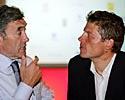
|
Injury problems in 1999 and an amphetamine-prompted suspension in 2002 prevented him from starting those Tours, yet in 2000, 2001 and 2003 he was the closest challenger to Armstrong. The strength of his challenge in 2003 led to expectations that 2004 could be his year, only for him to become ill during the race and finish, for the first time ever, off the podium in Paris. This summer he was frustrated again; a crash on the eve of the Tour plus one during the race hampered his challenge somewhat. He finished third.
Although Ullrich has become known for his gallant, but ultimately fruitless, bids to dethrone Armstrong, it's worth remembering that he is much more than a Tour de France rider. In the course of his career he's won the Tour of Spain, the Olympic road race title, two world professional time trial championships, the amateur worlds road race, the Tour of Switzerland, plus other important events such as the German road race championships, the Coppa Agostini, the Rund um Köln, the Tour d'Emilie and the Tour de Nürnberger.
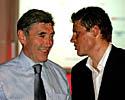
|
In many ways, Ullrich is the antithesis of Armstrong. A champion, sure, but one who has also tasted defeat, displayed frailties, expressed doubts and seemed, as a result of it all, to be a little more flawed but also a bit more human. We aspire to his triumphs while simultaneously identifying with his disappointments. And that's probably why, perhaps, people feel such a warmth towards him, still hold out hope of another Tour win. Ullrich is a superman, certainly, but one very much infused with the essence of Clark Kent; victorious, but also vulnerable.
The long-time T-Mobile rider has become used to the public's perception of him. "I think part of the [public] affection with me is because I always kept fighting," he said, speaking to journalists at a T-Mobile press interview before the final stage of the Tour of Britain. "I have had my difficult moments, as well as moments of glory. But at least I am not like an actor. I always say who I am and even if I have already lost the race, I keep on fighting for second place until the very end. I think that is something that the public appreciates."
Q: Jan, since 2000 you have raced Lance Armstrong many times in the Tour de France but he has always gotten the upper hand. Are you glad that he has now retired?
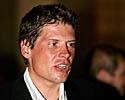
|
Jan Ullrich: It's not really a relief that Lance quit. Of course, I would have liked to beat him but unfortunately I couldn't. That is because he was the best over the last seven years.
The reason why it's not really a relief is because the Tour is going to change. For sure, we won't have a team like his that will completely control the race, or wants to control the race. So it's going to be different.
Q: But I guess it is a relief that you won't have to answer questions about him any more!
JU: Well, I always enjoyed racing against Lance. Of course, like I said, I would have liked to have beaten him but unfortunately it wasn't possible. Instead of questions concerning Lance, there will be some other questions. But life carries on, the sport goes on and for sure we will have some fun next year as well.
Q: When you say that the Tour is going to be different, do you expect something like the Tour of 1997, the Tour you won, which was the first one since Indurain retired?
JU: For sure, it will be hard to control the race. This year we had the situation where Lance had a very strong team at his side. He is the captain and the other riders help him. I think that in the past few years there has only been one team which could hold the bunch together and control it, and that was the team of Lance. So next year it's going to be a little bit different. It's going to be hard to control. It's going to make the race less organised and there's going to be a lot of attacks. We have to wait and see how that goes.
"I always say who I am, and even if I have already lost the race, I keep on fighting for second place"-Jan Ullrich on why people warm to him despite the ups and downs. |
Q: Will you try to control the race a little bit, because you like a more steady tempo?
JU: Everyone wants to bring a strong team like that to the Tour de France. In theory, what you need is a team which can control the race and ride in front of the bunch for 21 days. To protect the captain and make sure that the leader of the team is always well supported on the flat, in the mountains and in the team time trials. That's going to be really hard. We are going to try; we have already made contracts with promising riders and for sure we are going to have a very strong team. We are going to do it a little bit different, even better than this year, and hopefully it pays off.
Q: Were you happy with your Tour de France and your result? You had a crash at the start and during the race, but came very strong at the end.
JU: I can be happy about my result in the Tour. Of course, I had two crashes which certainly cost me a couple of percent of my form. But all in all, I can be happy that I got to Paris in a very healthy and good condition, because it could have been a lot worse.
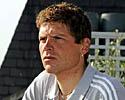
|
Q: In recent years, you seem to come into top shape in the last week of the Tour. How will you change your programme next year to ensure that you come into the race in the best possible shape?
Team press officer: No training behind the car!
JU: Well, maybe it doesn't look like it but definitely in the Tour de France I have been in my maximum form. I think that the preparation I did for this year really was good. There were those two crashes and they cost me a better placing on the GC. That is something that you cannot account for.
Q: How many chances do you think you have left of winning the Tour? How long can you go on for?
JU: Firstly, I will look forward to the next season. Then we will see.
Q: Are you concerned that with Ivan Basso and other riders, there appears to be another generation coming through? Armstrong may be gone but now there are new challengers to beat.
JU: The fact that Lance is not there any more does not make it any easier. For sure, Basso wants to try really hard to win. There are always new riders, a new generation and riders who nobody thought would be capable, the unexpected guys. So maybe it's going to be a lot tougher to win.
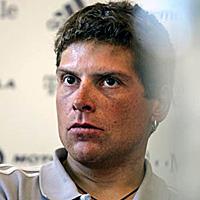
|
Q: What did you think about last night at the Tour of Britain Gala dinner, when you walked in and everyone was cheering?
JU: It was wonderful. I didn't know I had that many fans here in England, where you go in and get a standing ovation. It is just unbelievable. I had the time to chat with a lot of people, very informally, and given all that I am almost convinced that I will try to be at the start of the Tour of Britain next year.
Actually, I don't know if the applause was for me or for my girlfriend! (smiles)
Q: So you think you would like to race in the Tour of Britain?
JU: Yes, if it fits in I would really like to do it. I heard a lot of good stories from my team-mates who did the race this year, and why not? Let's see.
Q: Have you raced here before?
JU: Yes, I did the junior world championships in Cleveland.
Q: Looking back at your own career, have there been any periods that you regret?
JU: Well, there are always moments that are painful, that are very difficult, but that is life. You can't be always completely on top but, fortunately, you can't always be down. It's all part of life.
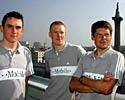
|
Q: People seem to have a lot of affection for you, both in Germany and outside. You are perhaps regarded more warmly than Lance Armstrong is, at least in Europe. Do you think that is because people see you as a good sportsman, that you have finished second five times in the Tour but you have always been very gracious about defeat?
JU: I think part of the affection for me is because I always kept fighting. I have had my difficult moments as well as moments of glory, but at least I am not like an actor. I always say who I am, and even if I have already lost the race, I keep on fighting for second place, until the end. I think that is something the public appreciates.
Q: Is it hard to come back with the mentality to win the race after finishing second so many times? In other words, to pick your morale back up and have the same ambitions as before?
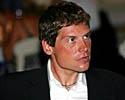
|
JU: Well, one is stronger in the head as you get older. But obviously, from the body's point of view, it takes more training and more kilometres and more intensity to get the same level of form. Nothing can go wrong, everything has to go right.
Q: Is your enthusiasm still as high as it was when you started out as a professional cyclist?
JU: I think even more so than before, I have more motivation than in the early days. Like I said before, I don't have to ride for the money. I do it because I like it and I love to do this. I love being a bike rider.
Q: You said a few weeks ago that you would not be doing the world championships. However, you showed pretty good form in the Tour of Germany towards the end of last month, winning the time trial and finishing second overall. You also won the Eurobike Altstadtkriterium Ravensburg criterium in recent days. Are you now considering doing the world championships?
JU: I would prefer not to go and have to do all the preparations for it. The thing is, if I prepare for the worlds, I prepare for the road race. I have twice been world champion in the time trial, so when I prepare for the worlds I do it for the road race. The problem is that in Madrid, the course is flat, it's not too easy for me to become world champion. I don't want to put all that extra training and extra effort in there when it doesn't make that much sense. I think my last race this year will be on the second of October in Zurich.
Photography
For a thumbnail gallery of these images, click here
Images by John Pierce/Photosport International
- Ullrich was a guest at the Eddy Merckx gala dinner in London
- Jan listens intently during the Eddy Merckx dinner
- Sara Steinhauser, Jan's girlfriend who also happens to be teammate Tobias Steinhauser's sister
- Ulle looked relaxed during the dinner in London
- Ullrich and Merckx have a chat during the dinner in honour of Merckx
- 'Well Jan, next year could be your year...' Eddy Merckx ponders the possibilities
- 'I reckon you're right, Eddy.' Ullrich shares a moment with Eddy Merckx
- Ullrich looking serious in London
- But that cheeky grin comes through... something which endears him to cycling fans
- Ullrich was in London for business where T-Mobile signed young British riders Mark Cavendish, Geraint Thomas and Ed Clancy
- l to r Geraint Thomas, Mark Cavendish, Toby Hester (T Mobile) Jan Ullrich with Mark Cavendish and Ed Clancy.
- Ullrich at the London press conference where he spoke about next eyar's Tour and his plans for the rest of 2005
